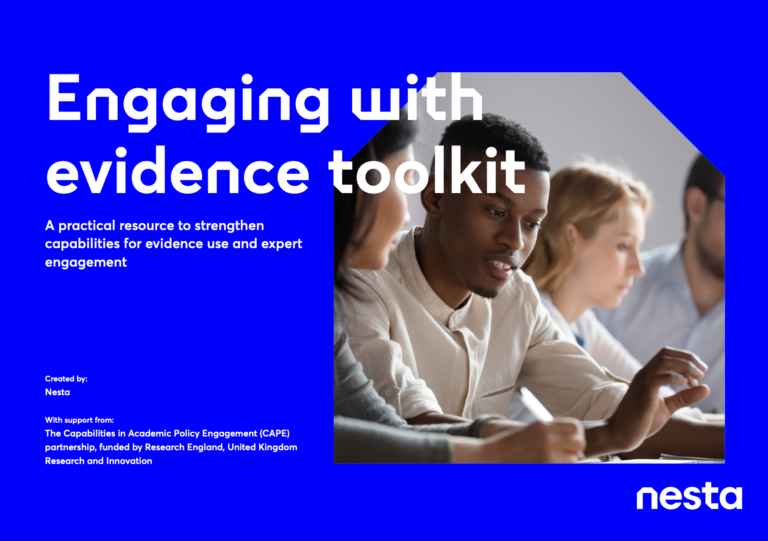The Engaging with Evidence toolkit was created by Nesta in partnership with the Capabilities in Academic Policy Engagement (CAPE) programme and the Chief Scientific Adviser’s (CSA) Office at the Department for Levelling Up, Housing and Communities (DLUHC).
It’s been designed to help you to understand how to harness data, information, knowledge, and wisdom (aka evidence) to inform live problems, and understand what ‘good’ and ‘better’ evidence use means in policy practice. It will support you to access diverse forms of expertise and engage with the UK scientific community to progress your goals. It offers a range of interactive activities that you can use to determine what evidence and expertise is needed for what purposes – and the principles, processes, methodologies, and tools that can support this work. We call these evidence use and expert engagement capabilities.
This toolkit has been structured in 7 modules of content that follow the different stages of the UK’s ROAMEF policy cycle, to help align the range of tools, methodologies, and activities provided to different purposes, live priorities and timeframes. Modules and activities within the toolkit can be completed in interactive PDF digital format, where free text boxes allow you to add notes and complete activities then save your work and return to it another time. Activities can also be used in workshops or team sessions by printing worksheets or uploading them to an interactive whiteboard. Time estimates for subsections have been provided throughout to help you use the tools you need at the times you need them.
Some of the biggest challenges in improving evidence use in practice are the time and capability needed to understand an evidence base, identify what evidence gaps are, and take the necessary steps to either use evidence to fill key knowledge gaps or generate evidence in close collaboration with partners. Discrete, time-bound learning content and activities can help policymakers and knowledge mobilisers alike take concrete steps to make sense of the evidence and expertise that can be used, generated or mobilised in support of different aspects of decision-making or policy. To support this work, the toolkit includes a range of case studies, resources, and activities that can help facilitate interactions and learning between policymakers and experts- such as the UK’s academic community. .
The toolkit is relevant for any project or group interested in improving capabilities for evidence use and expert engagement. You might work within national, regional, or local government, a public institution, or a non-profit, or you might be a knowledge mobiliser facilitating engagements between different actors. You may have different roles, and within your group have very different disciplinary and professional backgrounds. Whilst it makes explicit reference to the UK policymaking landscape, the tools can be used by anyone engaging with evidence and expertise in practice. The toolkit assumes no prior knowledge of how to use evidence and engage with experts in a policy context.
We brought together evidence experts and practitioners from across the research-policy nexus to discuss the challenges and opportunities for strengthening capabilities for evidence use and expert engagement for policy development.
https://www.nesta.org.uk/event/developing-evidence-capabilities-to-improve-decision-making-and-policy-impact/











